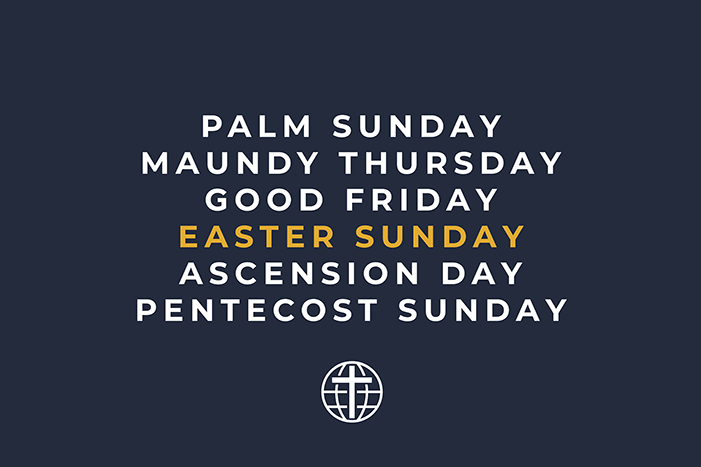
Dear GCI Family and Friends,
Coming down from Mt. Tabor after the Transfiguration, our Lord Jesus set his face toward Jerusalem. The journey to Jerusalem is ultimately toward the cross, and people shouting for Jesus to be crucified. Yet we cannot come to “Crucify him!” without the triumph of, “Blessed is he who comes in the name of Lord,” which occurred on Palm Sunday.
The crowds are absolutely correct as they sang praises of Jesus from Psalm 118. Designating him the title of king is accurate. Jesus is indeed the One coming in the name of the Lord; he is blessed; he is the King of Israel! The setting in which Christ parades down from the Mount of Olives finds Rome in charge of Jerusalem. The Temple is empty of God’s glory, and the people of Israel are in waiting. They are waiting for their King, but their expectation is for a conquering King on a white warhorse. However, we have the one who is already King entering not on a warhorse or chariot, but on a donkey. What?
Jesus did not enter Jerusalem as a militaristic king to overthrow the Roman regime. His kingdom is different and unexpected. His reign is humble, yet immeasurably powerful; it is founded on transformational godly love. His power is not displayed by overthrowing the gentile rulers, rather, it is shown through his willing and voluntary death on the cross, where sin and death are defeated.
Having entered the city, we now turn our attention to the events of the days leading up to the cross. It would be extremely confusing for someone to move from Palm Sunday and the Triumphal Entry only to return the following Sunday to hear about the Resurrection. What happens in between these two bookends is extremely important. To see the story as a complete story requires that we include the celebrations and recollections of Maundy Thursday and Good Friday.
As we move past the Triumphal Entry, we cannot miss how the humble procession of Palm Sunday frames the unfolding story. To fully feel the impact, we must juxtapose the image of the crowds crying “Hosanna” with that of Jesus standing before Pilate just five days later and the crowds screaming “crucify him!” It is not enough to simply focus on the original cast members. Feeling anger toward Judas, perplexed by Peter, or mystified by the fickleness of the crowd doesn’t take us far enough. A major reason we need to rehearse the unfolding story of Passion Week is so that we can personalize these accounts. Where would I be?
The real work is to recognize and own that I am the one shouting “Hosanna” and laying down palm fronds because I celebrate the triumphal entry. However, a few short days later, I am also a voice in the crowd approving his death with the words “Crucify him!” because he wasn’t the king I expected him to be, and because I am easily swept up in the emotion of the moment. O wretched man that I am. Who shall deliver me from this body of death? I thank God that through Jesus I can be delivered (see Romans 7:24-25).
Don’t just rush through this week—bask in the richness of what the week offers, savor in the deliverance. On Maundy Thursday dig into the Passover meal that Jesus shared with his closest friends. Note how he instituted the Eucharist with its simplicity and profundity. Think about the rich words of the new commandment he gave—to love as he loves. Pay attention to the instruction and encouragement that the disciples could not fully appreciate until months and years later. Place yourself in the story and think and feel the thoughts of the disciples.
On Good Friday feel the weight of being before Pilate, the sting and trauma of the cat-of-nine-tails, the heaviness of carrying the cross, the jeers of the soldiers, the presence of your mother and the disciple that you love, and the release from the words, “It is finished.” You can draw parallels between Psalm 22 and the words of Jesus on the cross. Be awed by the forgiveness Jesus bestows even while being murdered. The picture of pain, agony and humiliation serves to amplify the picture of victory on Resurrection Sunday. (I leave it to your pastor to share the Easter message.)
All of this is good, and it paints the story of Jesus and the salvation he brings for humanity. Palm Sunday reminds us of the humble, powerful, unique King that we hail as Hosanna. Good Friday reminds us of how quickly our hearts can turn away from the King. And because of his saving mercy, we have Easter Sunday to assure us that “He is risen, He is risen indeed!” In the middle of our up-and-down human experience that is so vividly displayed in the Passion Week and Easter, we have a Savior who set his face firmly toward Jerusalem—all because of his indescribable, non-fickled, undeterred love for us. And our risen Savior lives to continue the love story of bringing humanity to glory.
Wishing you an awe-filled Passion Week and Easter!
Greg Williams


 Such is the confidence that we have through Christ toward God. Not that we are sufficient in ourselves to claim anything as coming from us, but our sufficiency is from God. (2 Cor 3:5).
Such is the confidence that we have through Christ toward God. Not that we are sufficient in ourselves to claim anything as coming from us, but our sufficiency is from God. (2 Cor 3:5). 

 The man who finds a wife finds a treasure, and he receives favor from the LORD. Proverbs 18:22 (NLT)
The man who finds a wife finds a treasure, and he receives favor from the LORD. Proverbs 18:22 (NLT)
